Picture
Your Present Location: HOME> PictureChinese Think Tanks International Influence Forum
"Chinese Think Tanks International Influence Forum in 2019: Chinese Thoughts and World Changes in the New Era" is held on December 17th, 2019, in Beijing,China. The forum, which gathers over 500 famous scholars, social celebrities and media workers to share views about Chinese thoughts and world changes in this new era, is hosted by Renmin University of China(RUC) and Guangming Daily, and co-organized by Chongyang Institute for Financial Studies, Renmin University of China(RDCY), Think Tank Research And Publishing Center of Guangming Daily, Academy of Contemporary Chinese And World Studies, China Net and Think Tank: Theory and Practice Magazine.
Zhuang Yumin, Dean of the School of Finance of RUC, Executive Director and Dean of RDCY, presides the opening ceremony. Liu Wei, President of RUC, and Zhang Zheng, Chief Editor of Guangming Daily give opening remarks.
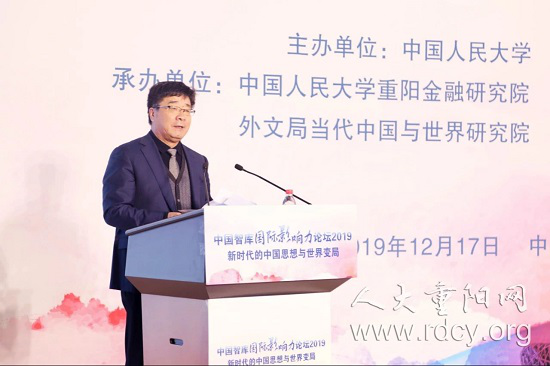
Liu Wei, President of Renmin University of China
President Liu Wei says, “The international influence of Chinese think tanks depends on whether Chinese government can transfer its advantages in political system to improve competency and efficiency.” According to him, by answering how China can make more contributions to human civilization and by putting forward proposals for this world, Chinese think tanks can raise profile internationally and promote the building of a community of shared future for mankind. In the new era, RUC has furthered its think tank construction from the strategic prospective. As an international platform in RUC, RDCY has made practice and explorations on global governance and the Belt and Road Initiative to improve the influence of Chinese think tanks in the world.
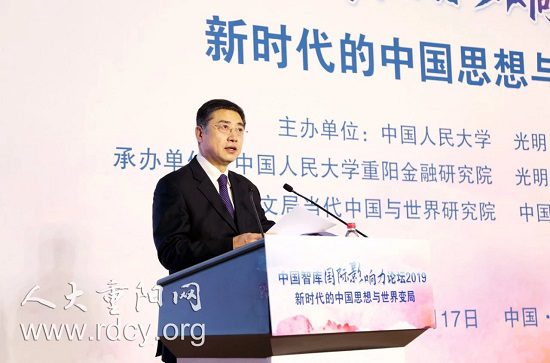
Zhang Zheng, Chief Editor of Guangming Daily
Zhang Zheng, Chief Editor of Guangming Daily notes that China has attached great importance to think tank construction in recent years. New-type think tanks with Chinese characteristics have achieved great development, with many professional think tanks springing up, such as RDCY and Academy of Contemporary Chinese And World Studies. In the future, there will be more high-end think tanks with great international influence and reputation in China, he says. He also gives his opinions on the relationship between the think tanks development and great powers competition.
Wang Wen, Executive Dean of RDCY presides the following keynote speech part.
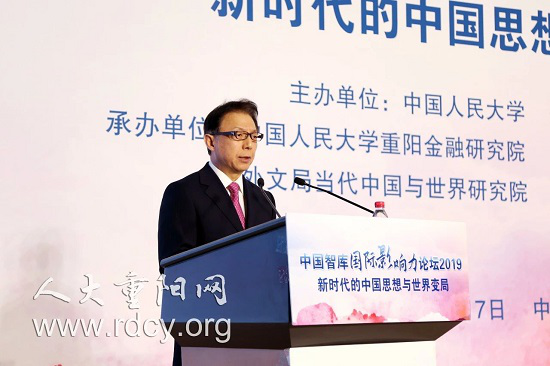
Zhou Shuchun, Editor-in-Chief of China Daily
Zhou Shuchun, Editor-in-Chief of China Daily makes a speech on “Establishing China’s Discourse in Political System amid the World ”, which is of great importance for China. Due to different political systems, the West holds biased public opinions against China, which are increasingly intense as China is moving to the the center of the world stage. Therefore we need to have confidence in our political system and interpret it from many aspects.
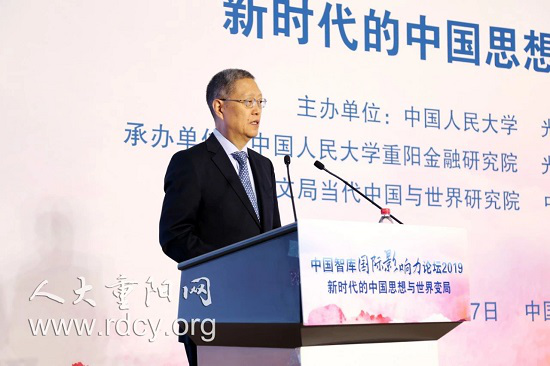
He Yafei, former Vice Minister of Foreign Affairs, Senior Fellow of RDCY
He Yafei, former Vice Minister of Foreign Affairs, Senior Fellow of RDCY delivers a keynote speech on “the Game between China and the US and the Role of Think Tanks ”. He analyzes changes in the Sino-US strategic relationships and concludes that “although there are changes in the Sino-US relationship, the trend of globalization is irreversible.” He also notes that Chinese think tanks should take the responsibility to promote exchanges with foreign countries.
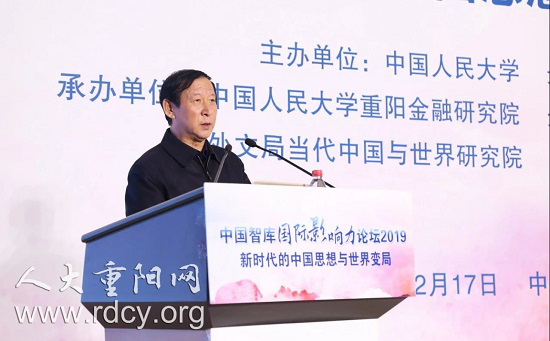
Yu Hongjun, Former Deputy Minister of the International Liaison Department
Yu Hongjun, Former Deputy Minister of the International Liaison Department addresses a speech on “ Both public opinion struggles and exchange and communication should be stressed when Chinese think tanks carry out external exchanges. ” According to Yu, China should attach importance to international communications where think tanks take many essential responsibilities. He said we should tell China stories well to the world through diversified humanities exchanges, and offered some suggestions.
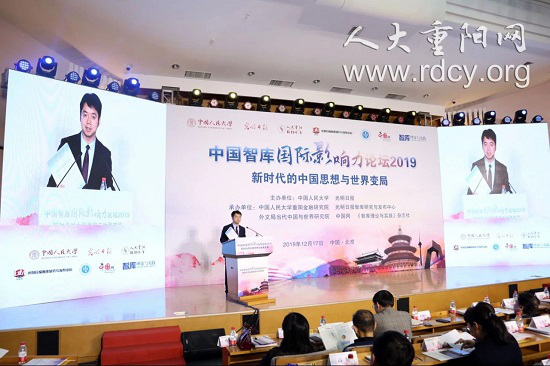
Wang Wen, Executive Dean of RDCY
In the following report releasing session, Wang Wen, Executive Dean of RDCY gives a report under the title “ The New Long March of Think Tank Construction: A Report on the 7 Years Evaluation of New Think Tanks with Chinese Characteristics and the Research about International Communication and Performance of New Think Tanks.” According to Wang, new think tanks with Chinese characteristics play an essential role in the decision-making in China, but there are higher demands, standers and expectation for it than ever. Chinese think tanks will continue its construction in the course of national governance modernization and national rejuvenation.
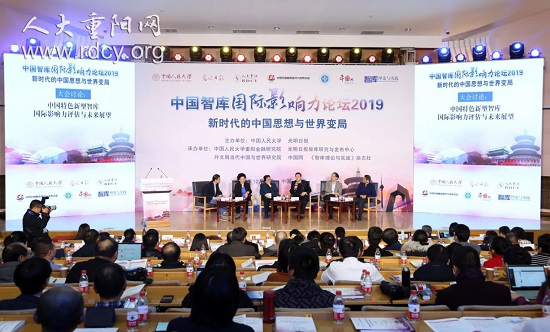
Discussion session “International Impact Assessment and Future Outlook of New-Type Think Tanks with Chinese Characteristics”
After that, Zhou Luohua, Vice Dean of RDCY presides the panel discussion session “International Impact Assessment and Future Outlook of New-Type Think Tanks with Chinese Characteristics”. Many guests join the session and express their opinions.
In the afternoon, the Forum starts with three sub-forums on the subjects of “The Game between China and the US and the Responsibility of Think Tanks”“ The International Discourse Power of Chinese Think Tanks in the New Era”and “Systems Reform and Think Tanks Internationalization amid Profound Changes ”respectively.
Wang Wen presides the following closing ceremony. Hu Xijin, Chief Editor of Global Times and Liu Xin, Hostess of CGTN give keynote remarks.
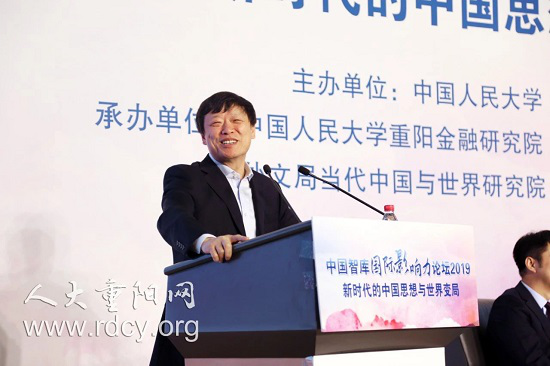
Hu Xijin, Chief Editor of Global Times
Hu Xijin, believes, Chinese think tanks can be more influential on the premise that China increases its influence in the world and strengthens the soft power. He offered some suggestions on think tank construction.
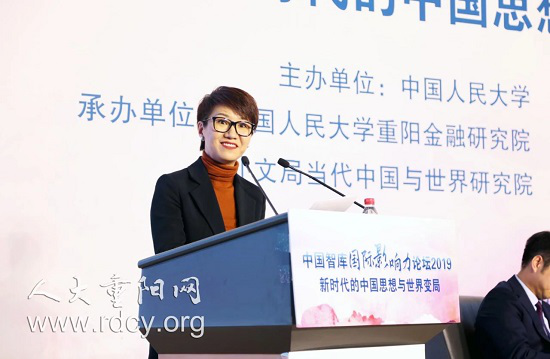
Liu Xin, Hostess of CGTN give closing remarks
Liu Xin notes that as China is drawing more attention, it is expected to give more voice. That is a historic opportunity. .In addition, in the process of external communication, China’s voice should be given out to the world by more people, not only think tank scholars, but also media workers.
Then Yang Qingqing, Associate Dean of RDCY presides three professors to give conclusions about discussions in the earlier three Sub-Forums.
At last, Wang Wen, Executive Dean of RDCY gives a closing address, expressing his thanks for all guests and colleagues unremittingly supporting RDCY.























































































 京公网安备 11010802037854号
京公网安备 11010802037854号





